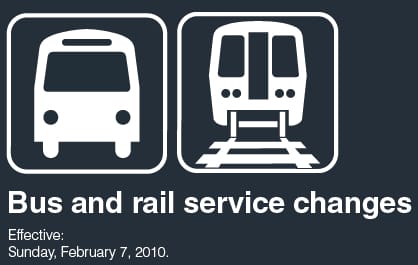In Defense of CTA "Doomsday"
Today, at long last, comes the day Chicagoans have dreaded in one guise or another since the bad old era of the Blagojevich regime: CTA 'Doomsday'. You might be surprised to learn I welcome it with open arms. Here's why.

Today, at long last, comes the day Chicagoans have dreaded in one guise or another since the bad old era of the Blagojevich regime: CTA "Doomsday". You might be surprised to learn I welcome it with open arms.
At the stroke of midnight, approximately 20% of Chicago transit bus service and 9% of 'L' rail service was eliminated, including all arterial express bus routes, and 1,100 union workers lost their jobs. It happened because the CTA's unions refused to offer pay and pension concessions at a time when sales tax revenues to help fund the system are at perilously low levels.
You can't say we--and the union--weren't warned. For a year, the CTA has advised anyone who would listen that the punishing cost of the existing union contracts simply could not be borne by current revenues, and that something would have to give. Either the union, or transit service, itself.
Unfortunately, after all the aborted cries of CTA "Doomsday" heard over the past few years, this time no one really felt like listening anymore. The state always seemed to ride in like a fiscal Lone Ranger and cover any budget deficit just enough to stave off service cuts. Even I thought that would happen this time around.
Last November when Illinois Governor Pat Quinn offered monetary aid to the CTA only on the conditions that fares not increase and threatened service cuts go forward, I thought he was pandering to longtime community activists who constantly rail against fare increases. (As if costs don't naturally rise over time, for transit service or anything else.)
Now I see the wisdom in Quinn's move. We've argued in this state about the cost of Chicago transit in good times and bad. Even before CTA "Doomsday" was so clearly on the table, the fixed and seemingly unquestionable cost of transit union wages, health care, and pensions was impossible to justify.
The reason is clear. The CTA exists to do one thing: that is, move three million Chicagoans around this massive city. That is its only reason for being. Not to provide guaranteed, lifelong jobs for union workers. And certainly not to protect work rules and compensation regarding those jobs to the point where moving those three million Chicagoans around becomes impaired.
Unfortunately, impairment of service has finally come to pass, and we three million Chicagoans have the unions' stubborness to blame for it. The unions refused to give, so transit service gave out instead. If Gov. Quinn had allowed the CTA to raise fares or had provided enough state money to stave off fare increases, we'd just be in this position once again next year as the transit unions dug in their heels and thumbed their collective nose at the potential for service cuts.
I'd much prefer my tax monies be spent on providing the transit service so needed in a city as congested as Chicago, rather than being used to ensure a false sense of entitlement among union workers who, unlike many thousands of Chicagoans, are lucky enough to at least have jobs. Of course, now 1,100 of them don't have jobs anymore, and I'm sure few Chicago transit riders who will face longer waits and more crowded commutes this week feel any sympathy for them.
But today's cuts are the only way forward. Unless Chicago transit service is to be permanently reduced or priced outrageously high (remember the Sunday-only service levels and $5 rides proposed during the Blagojevich administration?), then it's the unions who must give back. That's the gist of Quinn's strategy: once and for all show the transit unions you mean business by finally allowing "Doomsday" to happen.
Today no one wins. But if the 11th hour intervention by Mayor Daley is any indication, the negotiations are far from over. While the mayor could have intervened a little sooner, it's a help that he did. As the weekend began, the CTA's unions were offering $90 million in givebacks to get today's layoffs and service cuts reversed. If they manage to reach an agreement with the CTA, within a couple of weeks, bus and 'L' service levels could be back to normal.
That would be good news. Not just because Chicago would have its transit service back, but also because precedent would now be set to revise transit union work rules and compensation agreements to ensure that in the future, Windy City transit service is never again held hostage by a group of self-interested workers refusing to share the pain of a bad economy with their fellow Chicagoans.
I hope such an agreement happens. The only chance of it happening, though, is for us transit riders to bear the hopefully temporary pain of today's service cuts. So welcome, CTA "Doomsday".
I guess we had you coming.




